Related Research Articles

Cute 'n' Country is the second studio album by American country music artist Connie Smith. It was released in October 1965 via RCA Victor Records and contained 12 tracks. Cute 'n' Country contained a mixture of original songs and cover versions by other country artists. Featured on the album was the top ten single "I Can't Remember". Cute 'n' Country was Smith's second album to top the Billboard country LP's chart.

Connie Smith is the debut studio album by American country music artist Connie Smith. It was released in March 1965 on RCA Victor Records and was produced by Bob Ferguson. The album included Smith's debut single, "Once a Day". The song became her signature recording and biggest hit, reaching number one on the Billboard country songs chart.

Miss Smith Goes to Nashville is the third studio album by American country singer Connie Smith. It was released in March 1966 via RCA Victor Records and contained 12 tracks. The album contained original material including several tracks penned by Smith's mentor Bill Anderson. Miss Smith Goes to Nashville reached number two on the country LP's chart in 1966 and included the top five singles "Nobody But a Fool " and "If I Talk to Him".

Born to Sing is the fifth studio album by American country singer Connie Smith. It was released in September 1966 via RCA Victor Records and contained 12 tracks. The album was her first to include string instrumentation. It reached the top five of the Billboard Country LP's chart and included the single "Ain't Had No Lovin'".

Downtown Country is the sixth studio album by American country singer Connie Smith. It was released in January 1967 via RCA Victor Records. Downtown Country was the second of Smith's albums to include string instrumentation to help create a pop-influenced sound. The album also featured the single "The Hurtin's All Over", which reached the top five of the Billboard country chart. The album itself reached the top five of Country LP's chart following its initial release.
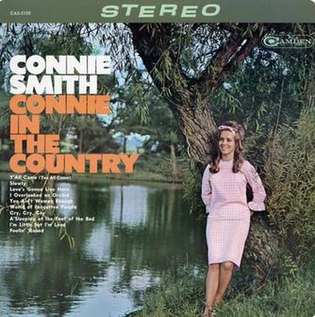
Connie in the Country is the seventh studio album by American country singer Connie Smith. It was released in February 1967 via the RCA Camden label and contained ten of tracks of material. It was her first to be released on RCA's budget Camden label. Unlike other RCA Camden albums, the project consisted of new recordings for Smith's catalog. This included the single, "Cry, Cry, Cry", which was a top 20 hit on the American country songs chart in 1968.

Connie Smith Sings Bill Anderson is the eighth studio album by American country singer Connie Smith. It was released in May 1967 via RCA Victor and featured 12 tracks. The album was dedicated to her mentor, Bill Anderson. It contained several songs made popular by Anderson himself, along with several tracks made popular by other performers. It also included the newly-recorded "Cincinnati, Ohio". Smith released her version as a single, which climbed into the top five of the American country songs charts. The album received favorable reviews following its release.

The Best of Connie Smith is a compilation album by American country singer Connie Smith. It was released in September 1967 via RCA Victor and featured 12 tracks. The disc was Smith's first compilation project released in her career and featured her most popular singles made commercially successful between 1964 and 1967. It also featured one new recording titled "I'll Come Runnin'". Penned by Smith herself and released as a single, the song became a top ten hit on the American country songs chart in 1967.
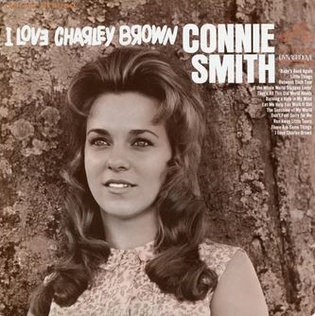
I Love Charley Brown is the tenth studio album by American country singer Connie Smith. It was released in April 1968 via RCA Victor and featured 12 tracks. The album reached the top 20 of the American country albums chart. It was described as a collection of pop-inspired country songs. Included were four cuts written by Smith's longtime songwriting collaborator, Dallas Frazier. Among his cuts was one of the album's three singles, "Run Away Little Tears". Along with Frazier's cut, the two additional singles included reached the top ten of the American country songs chart. The album was met with favorable reviews from critics.

Sunshine and Rain is the eleventh studio album by American country singer Connie Smith. It was released in October 1968 via RCA Victor and included 12 tracks. Sunshine and Rain featured an assortment of both new material and covers of songs by other country artists. The album reached the top 40 of the American country albums chart and received a favorable review from Billboard magazine following its release.

Connie's Country is the twelfth studio album by American country singer Connie Smith. It was released in April 1969 via RCA Victor and contained 12 tracks. The pop-inspired project included a mixture of original and cover songs. The album 'Connie's Country' was a hit, with a cover of Gordon Lightfoot's 'Ribbon of Darkness' reaching the top 20 on the American country songs chart. The album itself was also successful, placing in the top 20 on the American country albums chart. Critics praised the album for its quality and song selection.

The Best of Connie Smith Volume II is a compilation album by American country singer Connie Smith. It was released in March 1970 via RCA Victor and contained ten tracks. It was the second "Best Of" compilation released by the RCA Victor label that featured Smith's musical output. The disc compiled Smith's most popular singles between 1967 and 1969. The album reached the top 30 of the American country albums chart following its release. Also included was two new recordings. Of these new recordings, one was released as a single in 1969. Titled "You and Your Sweet Love", it reached the top ten of the country singles chart.
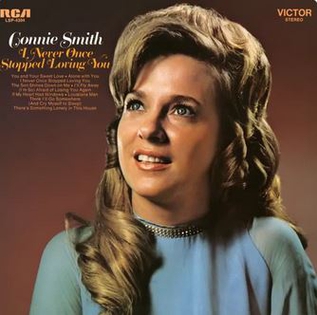
I Never Once Stopped Loving You is the fourteenth solo studio album by American country singer Connie Smith. It was released in September 1970 on RCA Victor and contained ten tracks. The collection mixed original material with covers of previously-recorded songs. Three singles were included on the album: "You and Your Sweet Love", the title track and "Louisiana Man". Both "You and Your Sweet Love" and the title track reached the top ten on the American country songs chart in 1970. The album itself charted in the top 20 of the American country LP's survey. Billboard magazine gave the LP a positive response following its original release.

Just One Time is the sixteenth solo studio album by American country singer Connie Smith. It was released in June 1971 via RCA Victor and contained ten tracks. The album was named for the lead single of the same name, which reached the top five of the North American country charts in 1971. The album itself would chart in the top 20 of the American country LP's chart following its release. Additionally, Billboard magazine gave the project a positive reception when reviewing it in 1971.

"If It Ain't Love" and Other Great Dallas Frazier Songs is nineteenth solo studio album by American country singer Connie Smith. It was released in July 1972 via RCA Victor and contained ten tracks. The album is a collection of songs composed by songwriter Dallas Frazier. Three of these songs were duets between Smith and Frazier himself. The album's title track was spawned as a single in 1972 and reached the top ten of the American country chart. The album itself reached the top 20 of the American country LP's chart and it received a positive review from Billboard magazine.
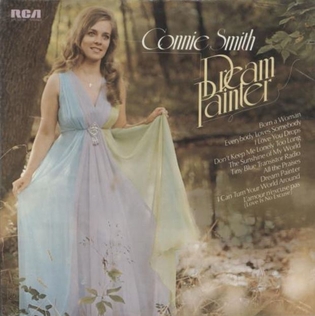
Dream Painter is a compilation album by American country singer Connie Smith. It was released in July 1973 via RCA Victor and contained ten tracks. The album was released following Smith's departure from RCA Victor and contained previously-released material. Two new recordings were also featured, including the title track. Released as a single, the title track would reach the top 30 of American country songs chart. The album itself would chart the American country LP's chart in 1973.
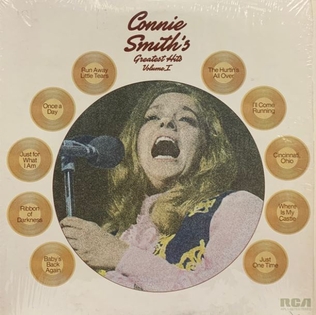
Connie Smith's Greatest Hits, Vol. I is a compilation album by American country singer Connie Smith. It was released in October 1973 via RCA Victor and contained ten tracks. The disc was one of several compilations released following Smith's departure from the RCA label. It included ten of Smith's most popular singles from her career, such as the number one single, "Once a Day", and top ten single, "The Hurtin's All Over". The album charted on the American country LP's chart in 1973 and received a positive review from Billboard magazine.
"Then and Only Then" is a song written by Bill Anderson and recorded by the American country artist, Connie Smith, on her Connie Smith. It was produced by Bob Ferguson and released in January 1965, reaching the Top 5 on the Billboard country music chart in early 1965, becoming her second major hit. It was her follow-up single to her multi-week number one hit, "Once a Day", which was released the previous year.

The singles discography of Connie Smith, an American country artist, consists of 48 singles, one music video and one additional charting song. After signing with RCA Victor Records in 1964, Smith released her debut single in August entitled "Once a Day". The song topped the Billboard Magazine Hot Country Singles chart by November and held the position for eight weeks, to date being the longest running song at number one by a female country artist. The single's success launched Smith into stardom, making Smith one of the decade's most successful female artists. The follow-up single "Then and Only Then" reached #4 on the country singles chart, while its flip side went to #25 on the same chart. All of Smith's singles released between 1965 and 1968 reached the top 10 on the Billboard country songs chart, including "If I Talk to Him", "Ain't Had No Lovin'", and "Cincinnati, Ohio". By 1969 Smith felt highly pressured from her career and cut back on promoting singles. Smith's chart success slightly declined because of this, with songs like "Ribbon of Darkness" (1969) and "Louisiana Man" (1970) only reaching the top 20. Other singles continued to peak within the top 10 including "I Never Once Stopped Loving You" (1970) and "Just One Time" (1971).
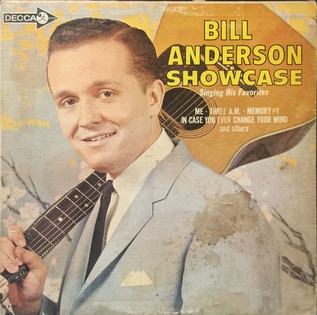
Showcase is a studio album by American country singer-songwriter Bill Anderson. It was released in November 1964 on Decca Records and was produced by Owen Bradley. The album was Anderson's third studio release as a recording artist and second to be released in 1964. It included two singles that became major hits on the Billboard country chart along with subsequent B-sides.
References
- 1 2 "Connie Smith: Songs, reviews, credits". AllMusic . Retrieved 23 May 2021.
- ↑ Bush, John. "Connie Smith: Biography & History". AllMusic . Retrieved 23 May 2021.
- ↑ Escott, Colin (2001). "Born to Sing (Box Set Liner Notes)". Bear Family Records .
- ↑ Smith, Connie (March 1965). "Connie Smith (LP Liner Notes and Album Information)". RCA Victor Records .
- 1 2 Smith, Connie (January 1965). ""Then and Only Then"/"Tiny Blue Transistor Radio" (7" vinyl single)". RCA Victor Records .
- ↑ Whitburn, Joel (2008). Hot Country Songs 1944 to 2008. Record Research, Inc. pp. 387–388. ISBN 978-0-89820-177-2.
- ↑ "Connie Smith Chart History (Hot Country Songs)". Billboard. Retrieved May 23, 2021.